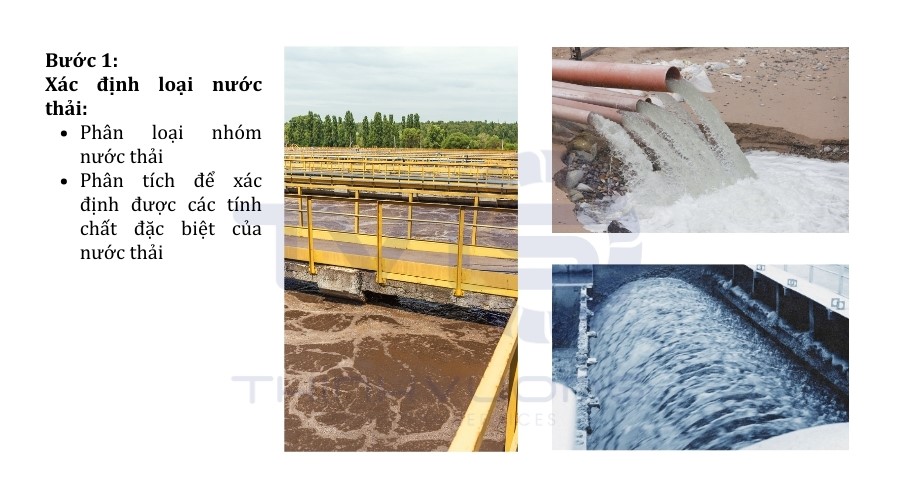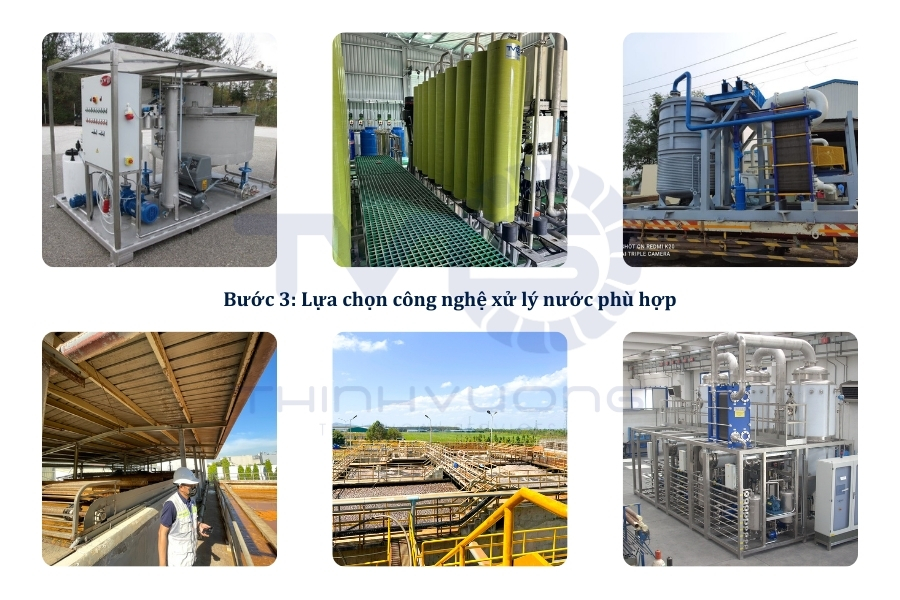In the context of increasingly strict environmental regulations and increasing awareness of protecting water resources. How to choose the right water, wastewater treatment and wastewater reuse system becomes important for every business. An effective treatment system not only helps businesses comply with legal regulations but also helps save costs and protect the environment.
In this article, we will provide detailed instructions on the criteria for choosing a water and wastewater treatment system based on the needs and budget of the business.
Instructions on How to Choose the Right Water, Wastewater Treatment and Wastewater Reuse System for Your Business
Nội dung
1. Determine the Type of Water to Treat
First, businesses need to determine the type of water they need to treat, thereby choosing the system that suits their specific needs.

There are three main types of water that businesses typically have to deal with:
1.1 Water supply
This is a clean water source used for daily life and production activities. Depending on the quality of the source water (surface water or groundwater), businesses need to choose a suitable water treatment system. The goal is to ensure that it meets the standards for safe living or production water.
Refer to clean water standards in Vietnam: QCVN 01-1:2018/BYT
1.2 Domestic wastewater
For businesses with internal activities such as: offices, factories, …. Domestic wastewater treatment is mandatory. Domestic wastewater treatment systems must ensure compliance with discharge standards. Domestic wastewater treatment standards in Vietnam: QCVN 14:2008/BTNMT.
Domestic wastewater treatment technology is of interest: chemical and microbiological technology, MBR membrane technology, ….
1.3 Industrial wastewater
For industries, wastewater contains many chemicals and specific pollutants. Industrial wastewater treatment systems must be designed to remove these harmful substances before being discharged into the environment or reused.
Industrial wastewater is divided into many different categories. Divided by each production sector, according to the standards of industrial zones, …. Therefore, clearly identifying the type of water that needs to be treated is the first step in choosing the appropriate water treatment system.
2. Assessing the Scale and Treatment Needs of the Enterprise
The scale and needs of water treatment are decisive factors in choosing the technology and scale of the treatment system. Factors to consider include:
The amount of water to be treated daily:
Enterprises need to calculate the amount of water used daily, thereby choosing a system with the appropriate capacity. Water treatment systems range in capacity from small to large, serving small businesses (restaurants, hotels) to large-scale industrial plants.
Input water quality and output water requirements:
Enterprises need to assess the input water quality and determine the output water quality target after treatment. This will affect the choice of treatment technology (filtration, disinfection, chemical treatment, microbiology, etc.).
Water reuse needs:
If the business has a need to reuse water after treatment, the system must be designed to suit the reuse purpose (irrigation, cooling, or serving other production activities).

3. Choosing the Right Water Treatment Technology
There are many different water and wastewater treatment technologies on the market, each with its own advantages and limitations. Businesses need to consider choosing the technology that suits their needs and budget.
Biological technology:
Biological treatment systems (such as Aerotank tanks, SBR tanks) use microorganisms to decompose organic substances in wastewater. This is a popular and effective technology for domestic wastewater and industrial wastewater with high organic content.
Physicochemical technology:
These systems use chemical methods (coagulation, precipitation) and physical methods (filtration, sedimentation) to remove impurities in water. This technology is suitable for wastewater containing heavy metals, grease or chemicals that are difficult to decompose.
Membrane filtration technology:
RO, UF, MF membranes are advanced solutions for removing small particles, microorganisms and dissolved ions in water. Membrane technology is suitable for pure water treatment applications or water reuse in industries with high water quality requirements.
Disinfection technology:
Depending on the output water quality requirements, businesses may need to apply disinfection methods such as using chlorine, ozone or ultraviolet rays (UV) to ensure clean and safe water.
Evaporation technology:
Some popular flight systems today are: Heat pump vacuum evaporation, forced circulation evaporation, plate evaporator, …

4. Consider Investment and Operating Costs
Budget is an important factor that businesses need to consider when choosing a water and wastewater treatment system. Costs do not stop at purchasing and installing the system but also include operating and maintenance costs throughout the life of the system.
Capital Expenditure (CAPEX):
This is the largest expense including equipment, construction materials, and system installation costs. Businesses need to choose a solution that fits their financial capacity, while ensuring the quality and performance of the system.
Operation Cost (OPEX):
Includes the cost of electricity, chemicals, and labor to operate the system on a daily basis. Advanced technologies can help save energy and chemicals, thereby reducing long-term operating costs.
Maintenance, maintenance, and repair costs:
Water treatment systems require regular maintenance to ensure stable operation. Businesses need to calculate the cost of replacing components, maintaining and periodically checking the system.

5. Compliance with Legal Regulations
Businesses need to ensure that water and wastewater treatment systems are designed and operated in compliance with current legal regulations. Factors to consider include:
Environmental permits:
Businesses need to ensure that they have a discharge permit from the environmental management agency before implementing a water treatment system.
Wastewater quality standards:
The treatment system must ensure that the output wastewater meets the wastewater quality standards prescribed by law.
Environmental monitoring reports:
Businesses need to comply with the requirements for periodic environmental monitoring reports, including testing the quality of water and wastewater after treatment.
Conclusion
Choosing the right water, wastewater treatment and wastewater reuse system is an important strategic decision for any business. To achieve the highest efficiency, businesses need to carefully consider criteria such as the type of water to be treated, the scale of demand, suitable technology, investment and operating costs, as well as compliance with legal regulations.
Thinh Vuong Technical Services Joint Stock Company is proud to be a reliable partner of businesses in providing comprehensive water treatment solutions, meeting all needs and budgets. Please contact us to receive in-depth advice and the most optimal solution for your business.



